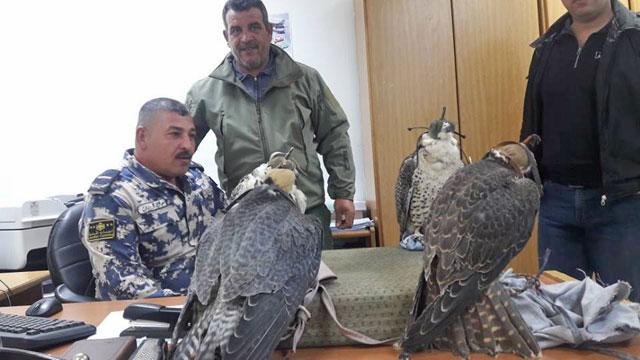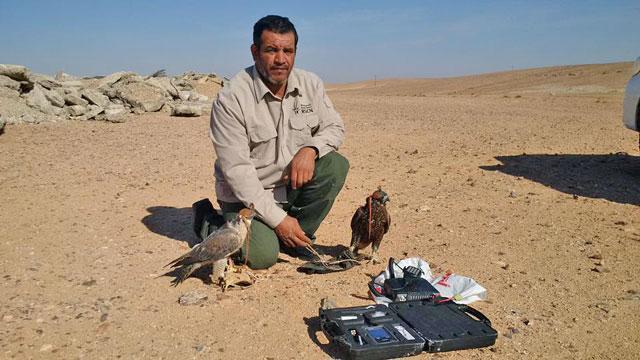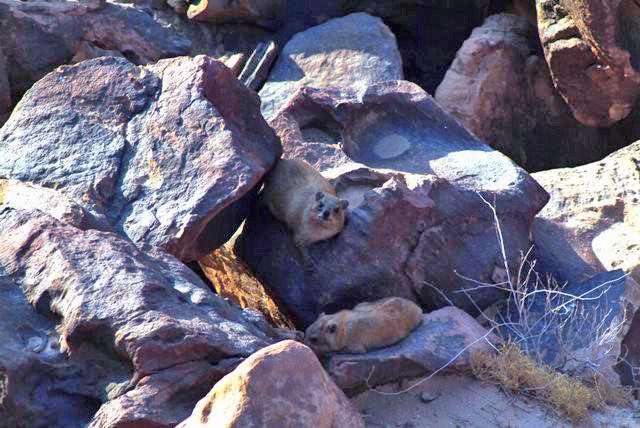You are here
Four confiscated falcons undergo rehabilitation process
By Hana Namrouqa - Mar 06,2018 - Last updated at Mar 06,2018

The seized and confiscated falcons are being rehabilitated before being released into the wild or sent back to the country of origin (Photo courtesy of the RSCN Facebook page)
AMMAN — A team of experts has started rehabilitating four falcons that were seized from a “smuggler” on Jordan’s border with Saudi Arabia earlier this month, a conservationist said on Monday.
The four falcons, peregrines and sakers, were discovered hidden in a “secret” spot in a vehicle entering Jordan via Al Omari border crossing, according to Abdul Razzaq Hmoud, head of the Law Enforcement Section at the Royal Society for the Conservation of Nature (RSCN).
A team from the RSCN and the Rangers received the smuggled falcons from the customs personnel, Hmoud said, noting that the wild birds are now in the possession of the society, while the alleged “smuggler” was referred for legal action.
“It is not allowed to bring falcons into Jordan and nationals of Arab Gulf countries should be aware of that by now, since official communications were sent on this regard,” Hmoud told The Jordan Times on Monday.
The RSCN, Jordan’s wildlife conservation and nature protection NGO, and the Ministry of Agriculture announced in 2015 that Gulf citizens entering Jordan are no longer allowed to bring in their falcons in order to prevent hunting of endangered species. The decision also came with the enforcement of laws and regulations, which prohibit hunting of falcons and the possession, display or sale of falcons in the Kingdom.
“This is the first case of confiscating falcons brought into Jordan since the start of the year. Nevertheless, it is of utmost importance to intensify inspection, whether on border crossings or in the wild, during this time of the year, when falconry activities increase,” Hmoud underscored.
Jordan’s decision to ban the entry of falcons into Jordan was taken in agreement with the Ministry of Agriculture and has been circulated by the Ministry of Interior to local agencies and embassies of the Arab Gulf states in Jordan to inform their citizens about the new regulations.
The ministry has always requested owners of falcons wishing to enter the country to submit certificates proving their birds are free of diseases, particularly bird flu. But, when owners of falcons started hunting endangered species such as houbara bustard and goldfinch, the RSCN banned the entry of falcons to the country to protect the wildlife, according to officials.
The society has received several calls to release the four falcons back to their owners, who showed them the passports of the birds. However, this is not enough, according to Hmoud, who noted that those wishing to bring falcons into Jordan should coordinate ahead of time with the RSCN, which represents the administration of the Convention on International Trade in Endangered Species of Wild Fauna and Flora in Jordan.
Jordan became a signatory to the CITES in 1978. The convention is an international agreement between governments aiming to ensure that the international trade in wild animals and plants does not threaten their survival, according to the convention’s website.
“The falcons are now undergoing a rehabilitation process by a team of experts. Once rehabilitated, the birds will either be released back into the wild in Jordan since they are migratory birds or handed over to their countries of origin for release,” Hmoud highlighted.
During the past year, around 21 falcons in possession of Arab nationals were seized and confiscated by the society.
Related Articles
AMMAN — As falconry training thrives during spring, authorities are intensifying inspections in desert areas to prevent the illegal activity
AMMAN — The Royal Society for the Conservation of Nature (RSCN) has seized and confiscated two falcons in the possession of Arab nationals i
The Royal Society for the Conservation of Nature (RSCN) has seized and confiscated weapons of unlicensed hunters who were hunting the rock hyrax, a mammal whose population is dwindling in Jordan, a conservationist said on Sunday.



















